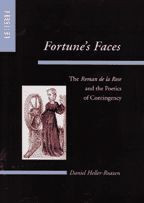Arguably the single most influential literary work of the European Middle Ages, the Roman de la Rose of Guillaume de Lorris and Jean de Meun has traditionally posed a number of difficulties to modern critics, who have viewed its many interruptions and philosophical discussions as signs of a lack of formal organization and a characteristically medieval predilection for encyclopedic summation. In Fortune's Faces, Daniel Heller-Roazen calls into question these assessments, offering a new and compelling interpretation of the romance as a carefully constructed and far-reaching exploration of the...
Arguably the single most influential literary work of the European Middle Ages, the Roman de la Rose of Guillaume de Lorris and Jean de Meun has traditionally posed a number of difficulties to modern critics, who have viewed its many interruptions and philosophical discussions as signs of a lack of formal organization and a characteristically medieval predilection for encyclopedic summation. In Fortune's Faces, Daniel Heller-Roazen calls into question these assessments, offering a new and compelling interpretation of the romance as a carefully constructed and far-reaching exploration of the place of fortune, chance, and contingency in literary writing.
Situating the Romance of the Rose at the intersection of medieval literature and philosophy, Heller-Roazen shows how the thirteenth-century work invokes and radicalizes two classical and medieval traditions of reflection on language and contingency: that of the Provençal, French, and Italian love poets, who sought to compose their "verses of pure nothing"in a language Dante defined as "without grammar," and that of Aristotle's discussion of "future contingents" as it was received and refined in the logic, physics, theology, and epistemology of Boethius, Abelard, Albert the Great, and Thomas Aquinas.Through a close analysis of the poetic text and a detailed reconstruction of the logical and metaphysical concept of contingency, Fortune's Faces charts the transformations that literary structures (such as subjectivity, autobiography, prosopopoeia, allegory, and self-reference) undergo in a work that defines itself as radically contingent. Considered in its full poetic and philosophical dimensions, the Romance of the Rose thus acquires an altogether new significance in the history of literature: it appears as a work that incessantly explores its own capacity to be other than it is.






